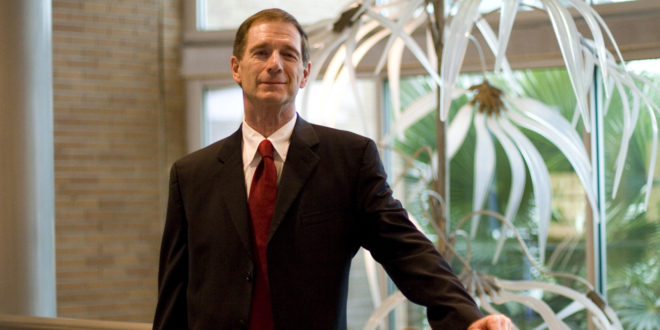Generally speaking, professors go through the lengthy publishing process of scholarly articles at a rate of about two papers per year, quite a feat given their workload.
Dr. Richard Cebula nearly matches that average per month.
Professor of Finance Cebula (Davis College of Business), has had nine published this year alone and during the course of his career “somewhat in excess of 500 scholarly articles and double-blind refereed scholarly journals.’’
The amount of work, according to Tom Coupe, the bibliophile who tracks such things, left Cebula ranked first in the world among economists in the 20th century in terms of the number of articles published in EconLit recognized journals.
That’s not including 15 books, the latest of which came out last fall, published through high-powered publishing houses such as Lexington Books, Barnes and Noble and Simon Schuster to name a few.
Obviously highly motivated, Cebula has been at his passion for more than 40 years since his first article, a two-page effort on multi-plant monopolies, and despite not knowing how he gets many of his ideas is disappointed if he isn’t working on an idea each day.
“I can’t tell you where the ideas always come from,’’ he said. “Often times there’s a literature that’s developed and I have seen work done in that field and found that it is not satisfactory and more rigor and depth was necessary. Also, I’m a voracious reader. I’ve come up with a number of ideas on my own out of the blue and I don’t know from whence they come.’’
The amount of article production isn’t lost on Dr. Donnie Horner, Senior Vice President for University and Academic Affairs.
“Rich Cebula is everything we want in a faculty-scholar at the University,’’ Horner said. “He’s fabulous in the class room, articulate, a great tutor and mentor but he is a prodigious author. The standard is to attempt to produce 2.1 articles per year. Really, most people, given the length of time it takes, a 12 to 14 month process, if you are doing 2.1 per year you’re cooking with gas. In Rich’s case, he’s cooking with high-octane gas because he is 10 to 15 a year, an idea a day person and that’s unheard of in any profession even in academe. He makes our game collectively better.’’
Cebula never fancied himself a writer growing up and wasn’t sure what he wanted to do.
A two-week stint with his uncle, Dr. Harold Lyons, a distinguished chemist at the old Southwestern at Memphis (now Rhodes College), set him on his life-long track.
“In that two weeks, I found out I really liked working with people,’’ Cebula said, “and in the jobs I have had I’ve done a lot of mentoring. It’s fun. I enjoy all of it so much I just find the energy.’’
As Horner noted, the publishing process isn’t easy.
Once Cebula has an idea he searches for other people who have worked on the topic or a related topic. If he finds that topic has been done, he will move to his next project. If he has a project on something that hasn’t been done, hasn’t been done recently or as thoroughly as he would like to see, he gets to work on it and puts his article together.
“I never know if it’s going to be a real contribution until it’s published,’’ he said. “The process will determine that. Once the work is done he will get input from friends and “if I’m really comfortable with it I’ll let my wife read it because she’s a wonderful editor and very smart.’’
His wife, Dr. Gigi Alexander, has vast knowledge of economics and psychology and is an assistant editor of a mainstream scholarly journal. She also has eight refereed articles to her credit.
Once all suggestions are taken into account, Cebula gives the article what he calls robustness checks.
“I try more sophisticated or alternative techniques of the same problem to see if the results are compatible or contradictory. Then, I get to the final writing which is the most tedious part because it involves so much, potentially, so much effort.’’
Once complete another key component of the process, is finding a good journal that is a good fit for the work and that alone can take several days.
“It’s so competitive out there if you send a good article to a journal that’s not interested in the topic you are wasting their time and yours,’’ Cebula said.
He describes the reviewing process by the article referees, who don’t know who authored the piece which is why it is called a blind process, as having the potential to be “very painful.’’
“When acting as referees, economists can be very demanding if not harsh,’’ he said. “You have to be a little thick skinned. Even if they like your paper they won’t necessarily be kind about the way they say it. You make your revisions and document the revisions and if you’re lucky and they like what you’ve done they sometimes become more gracious.’’
Once revisions are made the article is resubmitted and the process continues until the referees are satisfied. Six months to two years later, the article gets published.
“Sometimes I get an article rejected and that’s not enjoyable,’’ Cebula said. “I assess why it was not accepted and make revisions and often times send it to a better journal.’’
Having found his passion, Cebula can’t really see a day when he will let go.
“I do enjoy what I do immensely,’’ he said. “As long as God lets me do it, I’ll do it.’’
– Jim Nasella
 Wave Magazine Online Jacksonville University News Hub
Wave Magazine Online Jacksonville University News Hub
